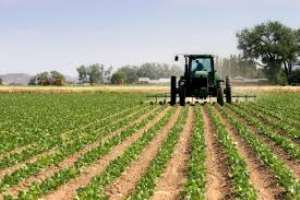
A GNA Feature by Bajin D. Pobia
Wa, Aug. 24, GNA - Agriculture is the bedrock of any meaningful national industrialisation effort, and engages more than 60 per cent of Ghana's working population.
Therefore, the incalculable importance of agriculture in Ghana cannot be overemphasized, because agriculture provides the very survival needs of Ghanaians and contributes substantially to the Gross Domestic Product.
The agricultural sector of the economy is dominated by numerous small-holder farmers and had witnessed many interventions to develop the sector.
Some of the interventions included the National Agricultural Extension Project (NAEP), the Volta Region Agricultural Development Project (VORADEP), the Upper Region Agricultural Development Project (URADEP), the Upper West Region Agricultural Development Project (UWRADEP) and the Sasaka Global 2000 Project.
Despite these interventions, the sector had not witnessed dramatic growth and development, except the cocoa sub-sector.
This has also been justifiably so because cocoa has been a major source of Ghana's foreign exchange earner and had received considerable governmental attention.
It is worth noting, that many of these agricultural development projects have been sponsored by foreign donors and agencies ended up without the desired effect.
This is because they are usually ephemeral in nature and suffer from sustainability deficiency. They are usually not designed to capture a sense of ownership by the beneficiaries to propel continuity.
The solution rests in modernising agriculture and there has been a lot of talk towards this policy recently.
This has led to the importation of a large quantum of agricultural machinery and equipment to implement the policy.
However, the mere importation of large numbers of agricultural machinery and equipment per se cannot do the trick without modernising farmers.
Farming today should be considered as a business that requires a good mind to comprehend what to do, a good training to know when to do what and a good skill to know how to do what, as well as a good understanding to know why to do what.
It is common knowledge that success in any business depends on having the relevant knowledge, skills and attitude in that business venture.
The same requirements are equally needed in doing farming as a business - that is modernised agriculture.
One may express the need for the Agricultural Extension Services of the Ministry of Food and Agriculture to train and educate farmers to acquire these characteristics and attributes.
But the question is how many Agriculture Extension Agents are available in the field to train and educate the farmers? How well-resourced are the available few to carry out their mandate and how well-motivated are they to develop goal-directed behaviours to achieve organisational objectives?
It is not surprising to find less than 10 agricultural extension officers manning a district. Obviously, such a number is grossly inadequate to create meaningful and positive impact on the numerous farmers in the district.
It is pathetic to know that the agricultural sector is very poorly resourced in terms of funds and logistics to efficiently and effectively carry out its mandate.
Agricultural workers in Ghana have been working under appalling conditions. Their remunerations compared to their analogous grades in other sectors fall within a lower income bracket.
Their fringe benefits such as vehicle maintenance allowances, travelling and transport and out-of-station night allowances, though approved in the budgets, have not been forthcoming.
Provision of transport for extension duties has become an obligate dependent on donor funded agricultural projects, which are sub sustainability deficient.
No risk allowances for exposure to very bad weather conditions such as the searing heat of the mid-day sun on the field, chilly conditions during severe rains harmattan and attacks by insects, reptiles and wild animals etc.
No overtime allowance is paid to agriculture extension workers even though they work with farmers during public holidays and weekends.
Obviously it should not be expected that officers working under such conditions could put up their best to achieve organisational objectives as agricultural modernisation because they are highly de-motivated and morale is very low.
Governments ought to realise that agricultural modernisation is capital intensive and requires an interplay of several factors to offer it a holistic approach to achieve the desire results.
But the appropriate utilisations of these resources to get Ghana out of poverty are hindered by leadership challenges and political will.
It is said that an antelope, which is destined to die does not listen to the hunter's whispering.
Is Ghana's agriculture destined to suffer like the antelope? If no, in the light of foregoing circumstances how realistic is agricultural modernisation in Ghana or?
GNA




 'Ghana beyond aid' has turned out to be 'Ghana without compass' – Naana Opoku-Ag...
'Ghana beyond aid' has turned out to be 'Ghana without compass' – Naana Opoku-Ag...
 Nation builder Mahama will deliver on his promise of a 24-hour economy for the b...
Nation builder Mahama will deliver on his promise of a 24-hour economy for the b...
 Prof Jane Naana is more than qualified to be Ghana’s first vice president and ev...
Prof Jane Naana is more than qualified to be Ghana’s first vice president and ev...
 WENDA petitions Akufo-Addo, Speaker of Parliament to make vote-buying illegal
WENDA petitions Akufo-Addo, Speaker of Parliament to make vote-buying illegal
 Supreme court declares payment of wages to spouses of President, Vice President ...
Supreme court declares payment of wages to spouses of President, Vice President ...
 Publish full KPMG report on SML-GRA contract – Bright Simons to Akufo-Addo
Publish full KPMG report on SML-GRA contract – Bright Simons to Akufo-Addo
 Kumasi International Airport to begin full operations by end of June
Kumasi International Airport to begin full operations by end of June
 Election 2024: Our ‘real challenge’ is getting ‘un-bothered’ youth to vote – Abu...
Election 2024: Our ‘real challenge’ is getting ‘un-bothered’ youth to vote – Abu...
 [Full text] Findings and recommendations by KPMG on SML-GRA contract
[Full text] Findings and recommendations by KPMG on SML-GRA contract
 Renegotiate SML contract – Akufo-Addo to GRA, Finance Ministry
Renegotiate SML contract – Akufo-Addo to GRA, Finance Ministry
